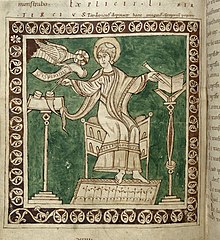
The Dialogues (Latin: Dialogi) of Gregory the Great is a collection of four books of miracles, signs, wonders, and healings done by the holy men of sixth-century Italy.
Summary
Writing in Latin in a time of plague and war, Gregory structured his work as a conversation between himself and Peter, a deacon. His focus is on miraculous events in the lives of monastics.
The second book is devoted to a life of Saint Benedict.
Reception
The Dialogues were the most popular of Gregory's works during the Middle Ages, and in modern times have received more scholarly attention than the rest of his works combined. From this, the author himself is sometimes known as Gregory the Dialogist.
Pope Zachary (r. 741–752) translated the Dialogues into Greek.
References
- Moorhead, John (2002). "The figure of the deacon Peter in the Dialogues of Gregory the Great". Augustinianum. 42 (2): 469–479. doi:10.5840/agstm20024227.
- Meyvaert, Paul (2004). "The Authentic Dialogues of Gregory the Great". Sacris Erudiri. 43: 55–130. doi:10.1484/j.se.2.300121.
- Moorhead, John (July 2003). "Taking Gregory the Great's Dialogues Seriously". The Downside Review. 121 (424): 197–210. doi:10.1177/001258060312142404. S2CID 169438580.
- Demacopoulos, George (2010). "Gregory the Great and a Post-Imperial Discourse": 120–137. doi:10.7916/D88S505K.
{{cite journal}}: Cite journal requires|journal=(help) - Ivan Havener (1989), "The Greek Prologue to the Dialogues of Gregory the Great: The Critical Text", Revue bénédictine, 99 (1–2): 103–117, doi:10.1484/J.RB.4.01416.
External links
Text
- A critical edition of the entire Dialogues in Latin with a Greek translation, in Sancti Gregorii Papae I, cognomento Magni, opera omnia jam olim ad manuscriptos codices Romanos, Gallicanos, Anglicanos emendata, aucta, & illustrata notis, studio & labore Monachorum Ordinis Sancti Benedicti, e Congregatione Sancti Mauri, published by Carobolus and Pompeiatus in Venice in 1769.
- Partial text of the Dialogues, as of 2022 including the preface and book 2, at the Bibliotheca Augustana
Translations
- Gardner, Edmund Garratt (1911). The dialogues of Saint Gregory, surnamed the Great; pope of Rome & the first of that name. Divided into four books, wherein he entreateth of the lives and miracles of the saints in Italy and of the eternity of men's souls. London: Warner.
- Zimmerman, ODO John (1959). Saint Gregory the Great: Dialogues. New York: Catholic University of America Press. ISBN 9780813211398.
- Zimmerman, John (2021). Saint Gregory the Dialogist: The Dialogues - Miracles of the Italian Fathers. Arizona: SAGOM Press. ISBN 9781945699382.